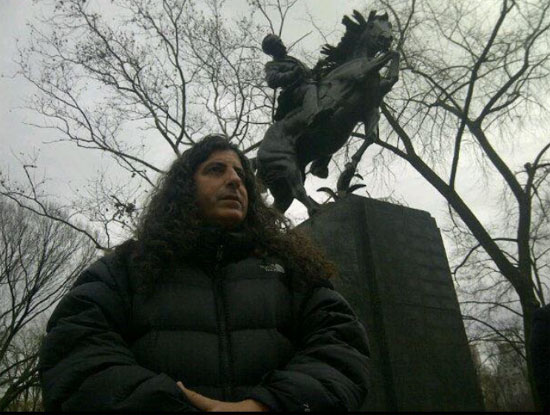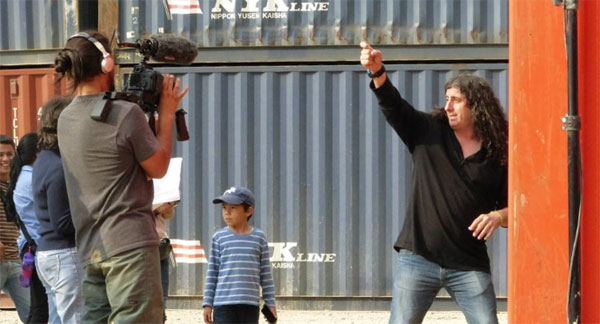Lilo, An Artist Who Fed Himself From Misery
By Angel Santiesteban
The Children Nobody Wanted
June 28, 2014

Lilo Vilaplana
When I began working in Cuban television, in the second half of the eighties of the past century, the first person they introduced me to was Lilo Vilaplana. He was already a star Assistant Director and they assigned him to teach me, in practice, his expertise.
We immediately became good friends, and friendship flowered as if an elf had taken us by the hand. I joined the post-production of a children’s series directed by Roberto Villar, and we would begin to produce an adventure fantasy written by the brilliant writer Daina Chaviano.
In the serial edition, we could see from our booth how they accommodated the trial of the Number One Cause of General Arnaldo Ochoa. I remember that our editor was famous for being one of the best in the trade, and he recognized that the soldier who was doing it in the other booth was excellent.
For example, in the scenes where the Republic’s Prosecutor or Raul Castro spoke to Ochoa directly, he replaced his angry face, sometimes his ironic smile, and showed him tired, jaded and perhaps even drugged, making him appear ashamed of what the Prosecutor or Raul said to him, like someone who recognized that he had made a mistake, and he deserved it.
That which I lived together with Lilo — and which maybe was the first injustice that we attended as witnesses — was a seed of rebellion. We swallowed that, and — in our youth, at 20 — maybe had awakened our consciences. Almost thirty years later, those beginnings have made us more deeply know the pride of being friends, in spite of geographical distances.
I remember those years of human and artistic development, where we shared his theater works and my stories. Taken by the hand by the persevering elf, we went to propose characters to Lili Renteria, to Jacqueline Arenal, who rejected one princess character because she preferred to be the witch.
Once, in the “Aquelarre” Humor Festivals, I was with my partner trying to gain access and, when it seemed that it was impossible because of all the people who were still outside, I saw Lilo passing in a line of five people who made way among the tumult contained by police and ropes.
I called to him, and he stopped with a smile that even now — remembering it — moves me; I had to say nothing else, he took me by the arm and put me ahead of him.
He was always giving like this; I believe that the hardships we have experienced have placed us on the same side, that I have always recognized that I had a childhood full of poverty, my mother — alone — raised five children and sometimes we had to go to school with holes in our shoes, or in the winters, we stayed in the house because we had no coats.
I wil never forget that Lilo, when he decided to become an artist, the first thing that he understood is that he could not achieve his dreams in his native and beloved Nuevitas, so “maddened,” he arrived in Havana without knowing anyone; that was the great course of his life, since he slept in the funeral home or sneaked into hotel pools in order to bathe.
His first great triumph was to get work in the Cuban Institute of Radio and Television (ICRT); his second triumph was to rent in the building adjoining the Cathedral in Old Havana. It was a small room without either bath or kitchen, which he celebrated as if he lived in a small palace.
Entering that citadel was like arriving at a giant anthill. The bathroom was collective, and Lilo told me that when the women bathed, their husbands had to protect them so that they were not seen. The citadel that Lilo recreates in his short “The Death of the Cat,” was based on that where he lived, very close to his friend Raul Guerra, where he took me once to listen to his mastery; there also I met his daughter, who was at that time in that interval of leaving childhood and entering adolescence, and who later would become that excellent writer who today is Wendy Guerra.

Lilo Vilaplana, Director
All this preamble in the life of Lilo was knitting or rather soldering his bones, those stories that — at times — you don’t know whether to laugh or cry, because he passes through the so extreme social dramas that Cubans — and so artists imitate it — tinge with humor, in order to avoid melodrama, and which serve as a safety valve, letting pressure escape.
All those human pressures, sadnesses and miseries with which Lilo coexisted served him — besides feeding and strengthening his creation — to — for the second time — arrive at an unfamiliar city, also in a foreign country, and in Lilo’s case, overcome all the obvious obstacles for any immigrant who, by luck, arrived with two suitcases, one of a trade and the other of talent.
Angel Santiesteban-Prats
Lawton Prison Settlement, June 2014
Translated by MLK
_____________________
| 